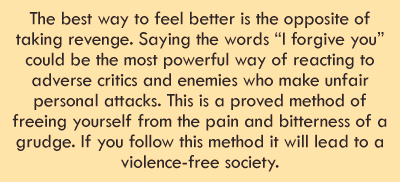
One day, General Paultre-Lamotte was walking along a street in Lyons, France, when he saw a soldier who was dead drunk. The General slapped him but later felt sorry for what he did. On the following day he called the soldier and asked, “Do you remember what I did to you yesterday?”
 “Yes, Sir,” said the soldier.
“Yes, Sir,” said the soldier.
“I too, now, suppose I give you five francs?”
“I would not accept them.”
“Ten?”
“Still no,” said the soldier. “A slap cannot be repaid with francs.”
“You’re right,” said the General. “I’ll embrace you and …”
“Yes, Sir, let us embrace each other and forgive and forget,” said the soldier.
We are living in a world where we are more criticised than praised. Some bosses are unfair and are waiting to give you the sack. Very often we hear about unfaithful husbands and wives. They inflict on their partners more pain than pleasure. We have been conditioned to do tit for tat. If you hurt me, I’ll do the same to you. We always hold a grudge against our enemies and critics. Then we want to take revenge.
I forgive you
Actually, the best way to feel better is the opposite of taking revenge. Saying the words “I forgive you” could be the most powerful way of reacting to adverse critics and enemies who make unfair personal attacks. This is a proved method of freeing yourself from the pain and bitterness of a grudge. If you follow this method it will lead to a violence-free society.
When you say, “I forgive you,” you do not give in, but you let go of enmity. Once you forgive, you are no longer emotionally handcuffed to the person who hurt you. Sometimes, people send poison letters to their enemies thinking that they will be hurt. When I receive – I have received many – a poison letter, I dump it in the nearest wastepaper basket without reading it. If I read it, I will also get angry with the sender. One day I met a person who had sent me a string of poison letters. When I greeted him as if nothing had happened between us, he was simply surprised. I invited him for a cup of coffee but took care not to mention anything about the poison letters.
Robin Cusarjian, author of Forgiveness: A Bold Choice for a Peaceful Heart, forgave the man who raped her when she was young. Another survivor of emotional abuse in childhood confessed, “Forgiveness extricates you from someone else’s nightmare and allows you to live in a state of grace.” However, this is something very difficult to do. Unless you have disciplined yourself to such an extent to forgive your enemies, you will continue to hold a grudge against anyone who crosses your path.
Resentment
 If forgiveness is such a good quality, why do people harbour resentment? One explanation is that when you were hurt you were powerless to do so due to many reasons. For instance, when a child is sexually abused, he or she will hold a grudge against the perpetrator throughout their lives. However, when he or she becomes an adult, they have the power to forgive the wrongdoer. In fact, Jacqui Bishop wrote a book titled How to forgive when you don’t know how to illustrate the point. When you forgive a wrongdoer, you will have a greater sense of power over him. The issue is not whether someone deserves forgiveness, but you deserve to be free from negative emotions.
If forgiveness is such a good quality, why do people harbour resentment? One explanation is that when you were hurt you were powerless to do so due to many reasons. For instance, when a child is sexually abused, he or she will hold a grudge against the perpetrator throughout their lives. However, when he or she becomes an adult, they have the power to forgive the wrongdoer. In fact, Jacqui Bishop wrote a book titled How to forgive when you don’t know how to illustrate the point. When you forgive a wrongdoer, you will have a greater sense of power over him. The issue is not whether someone deserves forgiveness, but you deserve to be free from negative emotions.
Sometimes we withhold forgiveness thinking that it is one of our weaknesses. When you forgive a wrongdoer, you are not letting him off the hook. It is like pulling the knife out of your own gut. It can free the former employee who remains bitter towards the employer. It can also free the ex-husband who remains bitter towards his wife for committing an act of disloyalty. If an employer can forgive an employee and take him back, he will be a loyal worker. Similarly, a husband who has been forgiven by his wife for his misdemeanor is unlikely to go astray again.
Although forgiving is a difficult act to perform, it is good for the body and the soul. When you hold a grudge against someone, you begin to relive the past and it can lead to all types of physical and mental diseases. As Dr Redford Williams says in Anger kills, “Simply remembering an incident that made a person angry has proved to be stressful for the heart.” Such negative emotions are also linked to high blood pressure, coronary diseases and other ailments.
Confused state
Although you can hurt somebody’s feelings instantly, forgiving a wrongdoer takes time. Initially, when you are hurt you feel angry. After some time your anger will turn into sadness and shame. It is at that stage you should think of forgiving the wrongdoer. The mitigating circumstances will help you to do it. When once you forgive a wrongdoer, he will feel weak, sick or ignorant. Sometimes, he will find himself in a confused state.
If you are willing to forgive your enemies and critics, you will have to prepare the ground. You may have to practice certain skills before forgiving someone. Initially, practise forgiving small hurts. Very often you are slighted by strangers. One day, a man in a long queue at a supermarket shouted at me for jumping the queue. As I had not jumped the queue, I remained calm. He shouted for some more time and cooled down.
Do not vent your anger on a trusted friend or a mentor. Without getting angry you can let go of your feelings in a polite manner. If you are unable to do so, rely on some anger-reducing strategies. Some people hit walls and tables when they lose their temper. The best way to let go of your anger is to go for a walk or write down your negative feelings in your journal. It is very much better than slamming doors and breaking plates.
Write a letter
Have you ever tried to write a letter to the person who hurt you? I have tried it with great success. State in your letter what really happened without blaming the wrongdoer. Tell him that you do not understand why he is angry with you. Finally, express a desire to hear from him. On many occasions, you are likely to get a favourable response.
Rely on the oft-quoted proverb: “To err is human, to forgive divine.” Forgiving does not mean forgetting. We simply cannot forget hurts inflicted on us. And there is no necessity to do so either. I remember two sisters who fought over who should look after their ailing mother. The elder sister who was living close by visited her mother and looked after her with care. However, she had a grudge against her younger sister who never visited her mother but sent money through post. Finally, the elder sister took the advice of an elderly person and stopped fighting and forgave her sister.
Forgiving leads to inner peace and tranquillity. It is thousand times better than harbouring a grudge against a wrongdoer.
